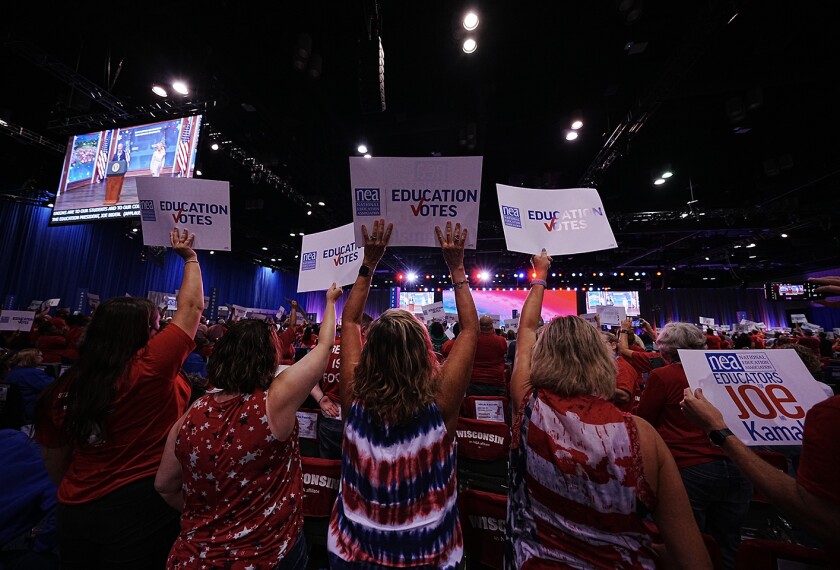Teachers are unfairly penalized on their classroom observations for working in high-poverty schools with students who are academically disadvantaged, a new study finds. And those teachers are often Black—leading to a significant race gap in teacher-evaluation scores.
The study found that the typical Black teacher in Chicago ranked at the 37th percentile in classroom observation scores, while the typical white teacher ranked at the 55th percentile. But once researchers controlled for certain school and classroom factors, including student poverty, behavioral infractions, and test scores from the previous year, the gap disappeared.
In other words, teachers in high-poverty schools are being marked down for factors out of their control, which experts warn could lead to them leaving their school or the profession—either voluntarily or involuntarily. That could hamstring efforts to improve the diversity of the teaching profession, which is already about 80 percent white nationally. (In Chicago, about half of teachers are white.)
And this phenomenon is likely happening in other school districts across the country, too. Past studies in Michigan and elsewhere have also found disparities in teacher-evaluation ratings between teachers of color and their white colleagues.
“We assumed—and can show in the data—that it’s not that Black teachers are lower quality than non-Black teachers. That’s not the case at all,” said Lauren Sartain, an assistant professor of education at the University of North Carolina at Chapel Hill and a co-author of the report. “In Chicago and elsewhere, Black teachers are just more likely to teach in higher-poverty schools than white teachers. … The working conditions are just a lot harder.”
Sartain and her co-author Matthew Steinberg, an associate professor of education policy at George Mason University, analyzed Chicago Public Schools data from the 2013-14 and 2014-15 school years, which were the first years of the district’s current teacher-evaluation system. The study was published Dec. 10 in a peer-reviewed journal of the American Educational Research Association.
“Evaluations can still be important, but the level of the stakes is a real question.”
Sartain and Steinberg found that 89 percent of the racial gap in classroom observation scores was because of school-based differences: Black teachers tend to work in schools that serve economically disadvantaged students, where test scores are often historically low. The other 11 percent of the gap was due to classroom-based factors, like instances of students breaking the district’s code of conduct or the percentage of a teacher’s students receiving free or reduced-price lunch.
Teachers’ value-added measures—which use changes in students’ test scores over time to estimate a teacher’s effectiveness—did not explain the race gap, nor did the race of the teachers’ evaluators.
“Principals and teachers really value classroom observations as a way to get feedback on their practice,” Sartain said. “People tend to think [the observation rubric] provides a pretty good definition of what good teaching tends to look like.”
But these findings, she said, raise some questions about whether the rubric’s distinguished ratings are even attainable for teachers in high-poverty schools.
Black Teachers in High-Poverty Schools
The study found that white teachers who work in high-poverty schools are just as likely to receive penalties in their classroom observations, Sartain said.
“The overall difference is really just reflecting that Black teachers are more likely to teach in those kinds of schools,” she said, adding that there wasn’t as significant a gap in classroom observation scores between white and Hispanic teachers.
Black teachers are sometimes tracked into high-poverty schools because of bias that can happen in the hiring process, said Travis Bristol, an assistant professor at the University of California, Berkeley’s Graduate School of Education.
But Black teachers also often want to work in schools serving economically disadvantaged communities because they believe they can be the most effective there, he said.
“They are choosing to work in schools that, on average, have students who come from historically marginalized communities,” Bristol said. “Some of those Black teachers come from similar life experiences.”
A body of research shows that if students of color have a teacher of color, they are more likely to graduate from high school, go to college, be identified as gifted, and receive fewer suspensions or expulsions.
Yet the instructional methods used in high-poverty schools often conflict with what evaluators are looking for, said Kate Walsh, the president of the National Council on Teacher Quality, a Washington-based research and policy group.
Teachers there “are meeting their kids’ needs, and they have a better understanding of what their kids need, but they don’t fall in line with what is the fashion of the day in terms of the instruction,” she said.
For example, she said, teachers in those settings might use more direct instruction. But Chicago’s classroom observation rubric, which was adapted from the Charlotte Danielson Framework for Teaching, emphasizes students working independently or in small groups.
The study found that on average, teachers receive higher observation ratings when they’re teaching in schools with strong instructional leadership and resources to support ambitious instruction and professional development.
High-Stakes Decisions
Teacher-evaluation ratings rely heavily on classroom observations, Sartain said. The study says that about three-quarters of teachers nationwide teach in non-tested grades or subjects where student test score data are unavailable, making the observation component even more important.
In Chicago, evaluation scores can determine promotion and tenure, and elsewhere, they can also lead to pay bonuses. While there are few teachers in Chicago whose evaluation scores are low enough to trigger a performance-related layoff, Sartain said, penalties on observation scores could send a message to Black teachers that they’re not as effective as they actually are.
“They [might] decide, ‘This profession isn’t for me. This school isn’t for me,’” she said.
National data show that Black teachers leave the profession at higher rates than their white peers, and teachers in the highest poverty schools are less likely to stay than those in schools with little or no poverty.
To make classroom observations more equitable, the study’s authors suggest that district leaders make statistical adjustments to control for the differences across schools and classrooms. That way, it would show teachers, “this is where I am relative to teachers who teach in a classroom like mine,” Sartain said.
Bristol said districts should also prioritize student surveys in their evaluation ratings: “What you want is multiple measures of how a teacher is improving learning for students—not excusing the context in which children are coming from, but taking that into account,” he said.
Chicago schools spokesman James Gherardi said in a statement that “providing an evaluation system that is fair, equitable, and drives school improvement is an essential priority” for the district. The district notes that evaluation scores have risen for all teachers over the last several years.
Since this analysis was conducted, Gherardi said, the district has commissioned a joint study with the Chicago Teachers Union to think of ways the evaluation system can be a more useful metric “that better prevents bias and improves training for evaluators and support for educators.”
Meanwhile, Sartain said that finding a fair way to observe teachers in all settings may be especially important this year amid the coronavirus pandemic. For many teachers, evaluations are still happening.
Some teachers who are teaching remotely say they are frustrated with being formally observed this year, since so many factors are beyond their control, like whether their students have working technology or reliable internet access. Teachers also say that in many cases, their evaluators don’t have any experience teaching remotely.
Yet experts say the main goal of an observation—providing feedback to teachers to help them improve—remains critical.
“I feel like teachers more than ever probably need the support and feedback about their practices and what’s working and what’s not working,” Sartain said. “Evaluations can still be important, but the level of the stakes is a real question.”








